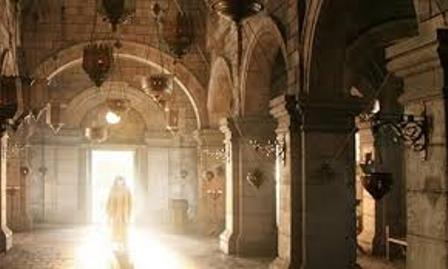But Majidi’s lavish $40m film is nothing if not well-intentioned, and what we do see – courtesy of Apocalypse Now DoP Vittorio Storaro, always verges on the symbolic, the Guardian wrote.
We first glimpse Muhammad as an adult from behind, shrouded totally in white, then there are snatches of romping baby legs, or Steadicam shots shadowing the boy prophet’s keffiyeh-swathed head, never without a faint Jedi aura.
We do hear him speak – although as first lines go, “The weather smells pleasant here” is no “Shit, I’m still only in Saigon.”
But it would be a distortion to get too hung up on the representation question, given what an evocative and engrossing account of Islam’s gestation Majidi has mustered: in effect, Muhammad’s origin story.
Framing events around a decade after his initial revelation, with his nascent band of followers under threat of eradication from pagan Meccans, most of the film is an extended flashback to the prophet’s childhood and early adolescence – revolving around his mother Aminah (Mina Sadati), grandfather Adbul-Muttalib (Alireza Shoja Nouri) and uncle Abu Talib (Mehdi Pakdel).
A sequence of extraordinary events – beginning with a vast flock of birds driving off a horde of elephant-riding Abyssinians just prior to his birth – suggest that far from a very naughty boy, this might be the messiah they have on their hands.
Majidi chronicles the first ripples of this revolutionary wave in a handsome, pre-CGI-era epic style. His “personal free comprehension” of events that are mostly skimmed over by the Qu’ran itself – there’s a blur of perpetually squabbling tribesmen – will be demanding viewing for anyone not versed in Islamic history.
The insistence on stately shot-making occasionally impedes Muhammad when it has to make a leap to the transcendental – Majidi never finds the equivalent of Darren Aronofsky’s ecstatic, pseudo stop-motion for the fallen angels in Noah.
But it feels like a far less erratic and more thoroughly immersed treatment of religious subject matter, with the kind of gestural flair the director made his name with in the late 80s producing many images of bracing beauty and metaphysical weight: such as when teenage goatherd Muhammad snags his robes on a briar, and unleashes a flood of airborne seeds.
That kind of thing speaks far more eloquently than the bouts of sermonising that Muhammad is occasionally prone to, especially when the film really wants to loudhail its own tolerance, and has the local Christians slightly implausibly applauding the newcomer.
In some ways, perhaps the film’s most radical message lies in its impeccably rich re-creation of the seventh-century Hejaz – for which massive credit should go to production designer Miljen Kreka Kljakovic and costume designer Michael O’Connor. It’s a fraught, heaving world, a polytheistic marketplace full of arbitrary violence and idolatrous come-ons; Majidi’s understanding of the pagan chasm out of which Islam emerged is in direct contravention of the ISIS blockheads trying to dump it into a void outside of history.
His film is intellectually honest, committed and poetic, but let’s hope we never need to call it “brave”.
9060**1771
Majidi's Muhammad is evocative account of Islam's gestation:Guardian
Aug 30, 2015, 2:46 PM
News ID:
81740708

Tehran, Aug 30, IRNA - This is not the first time the prophet of Islam has hit the big screen, but Moustapha Akkad's 1977 film The Message chose to relay Qu'ranic history only from Muhammad's point of view. Majid Majidi's Muhammad: Messenger of God, on the other hand, takes the representation plunge.

